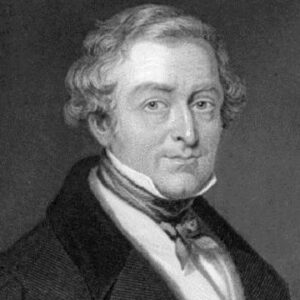Sir Robert Peel was an English politician who served twice as the Prime Minister of the United Kingdom and established the “Conservative Party.” Peel, who was the son of a wealthy cotton mill owner, was educated at Harrow and Oxford before entering the Conservative Party in Parliament. He began his political career as the undersecretary for war and colonies and the chief secretary for Ireland. Later, as home secretary, he instituted extensive criminal law and jail reform and established the Metropolitan Police. Sir Robert Peel was appointed as the Prime Minister of England after the dismissal of Earl Grey’s Whig government. However, he left after a year as a result of the minority issue with the Conservatives in the House of Commons, which he found increasingly unacceptable. Later, Peel returned to politics as part of a Conservative administration, and it was at this time that he oversaw the enactment of key legislation, including the Mines Act of 1842 and the Factory Act of 1844. He later attempted to overturn the Corn Laws, which had been enacted to defend British farmers. The Corn Laws were eventually repealed with backing from the Whigs and the Radicals, despite the fact that the topic sparked months of intense debate in parliamentștii. Following his failure on another bill, Peel quit his position. Never again did he hold office Several years later, Peel was severely injured in a horseback riding accident and died in London.
Youth and Early Life
Robert Peel was born on February 5, 1788, in Bury, Lancashire, England, to entrepreneur and politician Sir Robert Peel, 1st Baronet. His father was one of the wealthiest early Industrial Revolution textile manufacturers.
Peel attended Bury Grammar School, Harrow School, and Christ Church, Oxford, where he received a double first in classics and mathematics.
In 1808, Peel served part-time in the Manchester Regiment of Militia as a captain. The following year, while he was a law student at Lincoln’s Inn, his father influenced him to enter Parliament.
Robert Peel’s Career
Peel entered politics at the age of 21 as a member of parliament for the corrupt Irish borough of Cashel, Tipperary. The following year, in 1810, Peel became the undersecretary for war and the colonies.
When Lord Liverpool became prime minister in 1812, he named Peel as Ireland’s chief secretary, a position Peel held for the following six years. As chief secretary, he oversaw the development of a permanent Irish police force and established the groundwork for famine assistance.
After retiring from the position of chief secretary in 1818, Peel remained out of office for several years.
Peel was recalled in 1821 and offered the position of home secretary in the ministry of Lord Liverpool, where he remained until 1830.
In 1830, the Tories were swept from office by the Whigs when they refused to budge on other matters similar to those surrounding Catholic emancipation. The following years were exceedingly chaotic for his party, but in 1834 the monarch invited the Tories to form a government again, and Peel was chosen Prime Minister of England.
Peel published the Tamworth Manifesto in 1834, outlining the ideals upon which the modern British Conservative Party is founded. Peel resigned in April 1835 when his government was defeated by a coalition of Whigs, radicals, and Irish nationalists. The Conservative Party’s membership and confidence grew gradually over the next six years as a result of his astute and diligent strategies.
In the 1841 general election, the Conservative Party won a majority in the House of Commons, and Sir Robert Peel was re-elected, as prime minister.
In 1844, his government enacted “The Factory Act,” which limited the number of hours children and women may work in factories and established rudimentary safety regulations for machinery.
The sole unresolved issue in the free trade system in 1845 was the protection of agriculture provided by the Corn Laws, which supported farm revenues by restricting grain imports. Following the Great Irish Famine, Peel took action against landowners by removing the Corn Laws, a decision that ultimately led to his departure in 1846 and split his government.
Peel remained an active and important political leader after 1846, devoting himself to the defense of the Whigs’ free-trade ideals.
His Notable Works
Sir Robert Peel set the groundwork for a modern, professional police force with the Metropolitan Police Act of 1829. This act formed the London police force, whose personnel were referred to as “Peelers” or “Bobbies” in his honor.
The introduction of the notion of free trade was Peel’s most significant achievement as minister. In 1846, he was largely responsible for the removal of the Corn Laws, which had restricted imports.
Personal History and Legacy
Sir Robert Peel wed Julia Floyd, youngest daughter of General Sir John Floyd, 1st Baronet, in 1820. The marriage produced five sons and two daughters.
Peel was engaged in an accident in June 1850; he was thrown from his horse while riding on Constitution Hill in London, and the horse fell on top of him. Sir Robert Peel passed away on July 2, 1950, due to a fracture that ruptured his blood vessels.
Estimated Net worth
Robert is one of the wealthiest and most popular politicians in the world. According to our research, Wikipedia, Forbes, and Business Insider, Robert Peel has an estimated net worth of $1.5 million.


